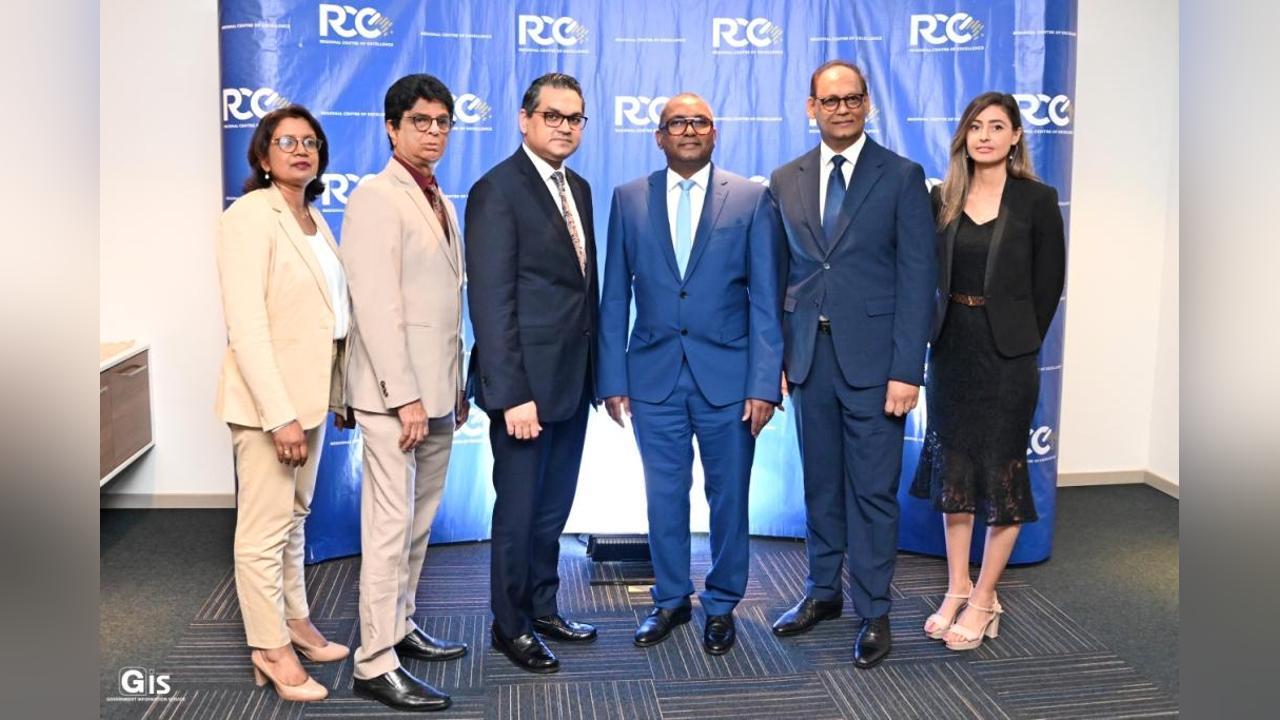
Africa-Press – Mauritius. A two-day hybrid workshop on “Sovereign debt management, sustainable bonds and debt transparency” aiming to strengthen Mauritius’ debt management capacity while enhancing its debt transparency, opened, this morning, in Ebène in presence of the Minister of Finance, Economic Planning and Development, Dr Renganaden Padayachy.
The Minister of Financial Services and Good Governance, Mr Mahen Kumar Seeruttun, the Governor, Bank of Mauritius (BOM) and Chairperson of Regional Centre of Excellence (RCE) Governing Board, Mr Harvesh Seegolam, the First Deputy Governor of Bank of Mauritius and Chairperson of Financial Services Commission (FSC), Mr Mardayah Kona Yerukunondu, and other personalities were also present.
The workshop is a collaboration of the RCE of the FSC and the Organisation for Economic Co-operation and Development (OECD). It will focus on sovereign debt management practices including challenges, risk mitigation techniques, sovereign sustainable bond issuance, debt transparency and transparent debt market and improved debt management; reducing cost of debt; and country practices from the OECD area and Africa.
In his address, Minister Padayachy stated that the RCE was set up in March 2019 and that since its inception, more than 3700 participants from some 113 countries have received training. He expressed his gratitude to the OECD for its continuous and unflinching support.
Underlying the adverse impacts of climate change and COVID-19 on sovereign debt management, debt transparency and sustainable financing, Mauritius, he indicated, uses these financial instruments to fund infrastructure development and invest in critical sectors.
He observed that in the last two decades the international domestic and external debt has risen more than five times adding that the African countries’ debt has rocketed to peaks.
As for Mauritius, it was necessary to increase its debt to support the Mauritian economy and the population to face the COVID-19 crisis, he underscored.
The Finance Minister further highlighted Government’s positive strategy of economic recovery and fiscal consolidation that has allowed the country’s debt to decline from 92% in June 2021 to 39% of the country’s GDP.
According to Moody’s, he pointed out, Mauritius fiscal strength rating has increased from Ba2 to Ba3. Likewise, the Standard and Poor’s Rating Agency commented positively on Mauritius economic performances and Government’s strategy for its improved policy making, he remarked.
These reports’ ranking will positively enhance the country’s position in the international financial market, he underpinned. Moreover, Dr Padayachy highlighted that with a robust growth of 8.8% in 2022 and a forecasted growth of 8% for fiscal year 2023-2024, Government aims to further reduce its sovereign debt.
He stressed on the need to maintain a cautious approach to borrowing and a low exposure to international markets for the country to successfully manage its sovereign debt and support its long-term economic growth.
As for GDP growth, he indicated that the figures are expected to be positive for the financial year 2023-2024. Minister Padayachy, additionally, mentioned that Mauritius is making progress in sustainable finance. Government is striving for sustainable inclusion in all sectors including the financial sector, he indicated.
They include extension of exemption of income derived from bonds to finance renewable energy projects; introduction of a carbon trading framework for blue and green credits by the BOM; and the issuance of the first national guide on sustainable bonds as well as the publication of the FSC guidelines for issue of cooperate and green bonds in 2021.
The Minister reiterated Government’s commitment to continue to explore innovating funding model and adaptability in the ever-evolving financial landscape.
Ensuring the sustainability and management of sovereign debt will continue to be a key economic priority for Government in shaping the country’s future towards a more sustained and inclusive growth, he affirmed.
The Finance Minister also underlined the prerequisite for international bodies to collaborate and share best practices. The way forward is charted with a blend of innovation, responsibility, transparency, and sustainability, thus ensuring the prosperity of the nation, he stated.
As for Minister Seeruttun, he emphasised on shared power of learning to adapt to current trends and address common challenges. Government, he underlined, aims to develop and promote the efficient functioning of financial markets.
Speaking on the aftermath of the COVID-19, he observed that the debt burden increased by 9% of GDP in the first year of the pandemic for developing countries.
According to Statistics, Mauritius also has recorded an increase in debt. He called on stakeholders to make the maximum of the workshop to proactively deal with the current situation.
Transparency, he pointed out, is a key factor to help policy makers to make informed decisions, evaluate credit worthiness and evaluate spending government expenditures.
’’The more transparent a country is the higher credit ratings it enjoys and stands a better chance to attract more investors,’’ he said.
Regarding sustainable bonds, he indicated that the bond market has evolved, and thus stressed the need to keep pace with industry players to position Mauritius as an attractive sustainable finance gateway.
Government is also working on the Environment, Social and Governance (ESG) framework to satisfy ESG performance across key environmental and social matters; ESG compliance; and ESG disclosures to ensure impactful investment, highlighted Minister Seeruttun.
As for the Governor of BOM, he elaborated on the challenges of climate change and geopolitical effects of Ukraine and Russian war on the global economy.
The future of sovereign debt and the way forward necessitates bold measures for strong macroeconomic performance, a healthy debt trajectory and a green finance hub, he underpinned.
For his part, Mr Yerukunondu stressed on financial discipline and sustainable financing and the need to keep a balance between borrowing while ensuring debt sustainability.
He enumerated several initiatives undertaken by the BOM to address debt vulnerabilities and work on environmental, social, and governance framework for green and sustainable bonds.
For More News And Analysis About Mauritius Follow Africa-Press






